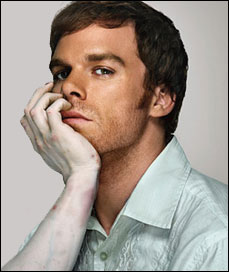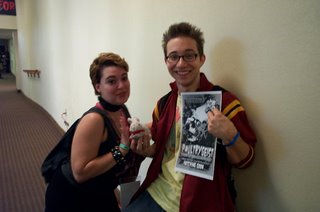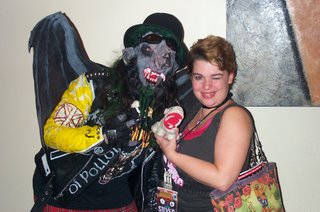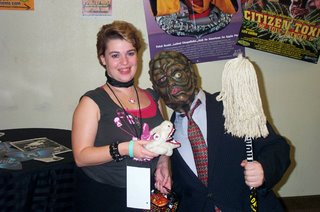
Dexter dates a single mother whose ex husband traumatized her with abuse. She is incapable of sexual affection. She has two children. His boss, despite his ability to solve difficult murder cases, hates him. He’s charming, funny, sensitive, generous, attentive, supportive, and slow to anger.
If you think he’s too good be true, you’re right because he is a serial killer. Methodical, detached, merciless, cruel. He stalks his victims-studying their habits with an unflinching eye. When he is confident his plans are flawless, he abducts his intended victim and before chopping them to pieces while they are still alive using a variety of tools, he extracts a drop of blood for a slide-the only trophy he keeps of his victims. The only thing to left of his victims after he disposes of the rest of the body.
But what makes Dexter interesting is his choice of victim-other serial killers.
Despite his sociological inability to empathize or even achieve the simplest connection to others, including his foster sister, Dexter has a rigid sense of morality. Since he must kill, he purges his desire by killing those whose demise will improve the safety of the community-pedophilic and sadistic serial killers.
Dexter is, in other words, living embodiment of Robespierre’s claim that, “Terror is nothing more than justice. Prompt, severe, and inflexible.” He also seems to prove the Machiavellian credo that sometimes the greater good is obtained by indulging in intensely evil and corrupt acts.
Dexter may, in fact, have been inspired by two real serial killers: John Bunting and Robert Wagner. These two men claimed that they murdered pedophiles because they were doing “terrible things to children…” Although some of the victims were pedophiles, Bunting and Wagner later opened their victim pool so wide, they even murdered their own friends. Further Dexter’s charm and attractiveness as well as his intelligence are reminiscent of famed serial killer Ted Bundy, who attended law school.
 Monsters have a way of becoming over time romantic heroes. Vampires, once considered foul disgusting monsters reeking of rotting flesh, have now become beautiful victims of circumstance-no less heroic than tuberculars in a Victorian novel. The Hunchback of Notredame went so far as to become a Disney cartoon. Dexter follows in the cinematic tradition of John Doe in Seven, Jigsaw in the Saw franchise, and Hayley in Hard Candy. What makes these characters sympathetic is their choice of victims.
Monsters have a way of becoming over time romantic heroes. Vampires, once considered foul disgusting monsters reeking of rotting flesh, have now become beautiful victims of circumstance-no less heroic than tuberculars in a Victorian novel. The Hunchback of Notredame went so far as to become a Disney cartoon. Dexter follows in the cinematic tradition of John Doe in Seven, Jigsaw in the Saw franchise, and Hayley in Hard Candy. What makes these characters sympathetic is their choice of victims.
Although Showtime claims in its press release that the show is supposed to make the viewer question certain ethical questions, it’s fairly clear from the way the scenes are cut that Dexter is supposed to be sympathetic. Otherwise, why would the camera cut away right before his victims are killed? To spare the viewer from having to see the reality of Dexter’s murderous apathy. The cutaways allow us to identify with him without having to question the cruelty of his acts (unlike in Hard Candy which makes it very explicit). Dexter is part wish fulfillment-a charming attractive vigilante serial killer who worries about safe driving-and part reflection-manipulative, fake and apathetic.
This is not to say that I don’t enjoy the show. When it was announced that Showtime was going to do a show about a serial killer, I was worried it was going to degenerate into cliché, but everything goes against expectation from the casting to the light design, and even the cubano influenced music. Michael C. Hall, best known for his portrayal as David on Six Feet Under, is cast here as the charismatic and confident Dexter while Julie Benz, formerly Darla on Buffy the Vampire Slayer and Angel, plays his traumatized girlfriend. The set designed utilizes mostly white contrasting with some red and black, which very different from the trend of earthy-tones shadowy horror movies of the past year (Hostel,Wolf Creek, Texas Chainsaw Massacre: The Beginning). Horror is often a genre associated with shadows and darkness. This show goes in the opposite direction-the murders happen under flood lights even when perpetrated in an abandoned warehouse at night.Even the costuming choices are subtle and effective. When Dexter leaves the scene of a particularly unusual murder, he is wearing a dark grey shirt while the crowd around him dressed in light pastels. This contrast suggests that Dexter is not like the rest, that he doesn’t belong.
The writing is also playful which invites and intrigues the viewer in the same way that Humbert Humbert’s word games seduce readers in the novel Lolita. Dexter’s boat is called “The Slice of Life”, an interesting double entendre. Much like the lead in American Psycho, Dexter is self aware proclaiming himself to be a “very neat monster.” But unlike Patrick Bateman, Dexter has an objective sense of right and wrong that is not distorted by emotional detachment. When a pedophilic serial killer is about to find himself Dexter’s next victim, he asks Dexter why he is superior. “Because I have standards,” is the cold response. Perhaps my most perverted moment of enjoyment was when Dexter talks about the surreal nature of going to a murder scene in Miami during the daylight hours and refers to it to it “as being like a new and daring section of Disney World called Dahmerland.”
Sick. Sick and funny.

Tomorrow I rise early to go to Brooklyn. From there I shall be catching a ride to Providence RI where I shall be attending the horror film festival there. A whole weekend in the dark with lots o' the spooky. Packed my outfits, candy, killer rabbit, DVDs to be signed, spooky t-shirts, even have my House of a 1,000 Corpses lunchbox filled with road snackies. Not to mention a date already lined up. (Don't worry. He's already enslaved and I'm not really interested. But far be it from to prevent some poor languishing fool from buying me dinner.)
But I thought I would leave you with this picture of myself and Marv with my new heartthrob Jason Yachanin the male lead of Poultrygeist. (It's the smile.) Fangoria was the first horror convention for both of us. Marv even allowed Jason to hold him. Clearly it is Fate.
Now off to bed.
I used to hate midtown. Couldn’t walk down the street between the tourists, the women with the SUV sized strollers, and the self important assholes in suits. I thought, back then, if I could just walk down the street without having to get hip checked and tagged on the shoulder, I would be happy. I should be happy now-this empty street.
It’s a dangerous thought.
I decide to focus on something else. I should be thinking about what to do next. I’ve been putting it off, but it seems that there is no other choice. Take a car and drive up to my mother’s house? Drive to another city and see if there are others like me? Try and find a radio station or TV station and pray that that they left some sort of broadcasting for dummies book around so I can find others.
I look at the huge MacClaren stroller overturned at my feet. It’s still laden down with a water bottle, blankets, toys, no baby though.
No baby.
The virus or poison or whatever it is-it thrives on endorphins. That’s what the news told us. When the news was still on. Claimed it was engineered in the Middle East as part of the war on terror. Killing us with our own smug satisfaction. Not a bad idea. Although I’m not entirely convinced that it wasn’t our own government. Some brilliant scientist exploring a hypothetical possibility until Joe Bob from Tallahassee sent a letter on fake letterhead asking for a sample of that there highly secret poison and off it went. And before you know it people are grinning themselves to death in Florida.
I didn’t think I would mind so much. I mean, I always thought Florida was the gateway to hell. And lord knows I hate happy people. How many times did I sit in bars, restaurants, buses, trains, benches and see couples holding hands and smiling and wish them dead? Not that I did this. Not that I’m guilty, but I have to admit that since this happened I have realized that real horror isn’t justice or cruelty-it’s wish fulfillment. It’s here take it and now look and see what you really wanted.
The children. The children went first. Of course, they would. Did they think about the children? I didn’t. I was wishing those couples dead, thinking of a virus that kills happy adults. I didn’t think of the children. And what children did survive-their eyes large and hollow, their bodies marked by things I would rather not think about. I'd seen them before in textbooks, newspaper clipping, special newsreports. Sure, they would survive until they found some young mother who had lost her child. She would scoop up this child and kiss her cheeks and hug her and tell her about the wonderful things her new life was going to be like.
They’d both be dead within the hour. But I supposed they at least died happy. There’s something in that. The only way for us to survive now is through misery, brutality, and rape.
I think about my friends. What would they think of me now? If they were alive to think it, that is. They always thought that my tendency towards depressions was going to ruin my life. They thought of themselves as the survivors-those who could always see the bright side, with the go get 'em attitude. Look what they got out and got. I wonder if they would be amused that out of all them, even insane Howard the lawyer with B.O. issue, I was the only one who managed to survive.
Well for this long. Because objectively I have to admit things don't look good. Sure I can go on being miserable. That's not a problem. Even before everyone I knew died, I was depressed. Couldn't get a date then, certainly not gonna get one now. Not going to have children. Not going to get married. Not going to finally get a promotion. I can't even have chocolate. The endorphin rush. Can't risk it. But eventually something will get me, even if it's not the virus. The question is how long?
Of course why would I want to survive like this? Biological imperative? Denial? Can't be hope. Hope kills these days. Literally.
So a couple of things. Robg of Icons of Fright has posted a preliminary report of the Fango weekend. I shall be supplying supplemental material and also trying to write my review of the Last Rites of the Dead to try and get it included for this months update. And I just had a massage yesterday.
Must go get food and then begin the brilliance!

Well the good news is I took the kitty to the vet yesterday and she is official cured, although this disorder can reappear at almost any time so I have to keep an eye on her.
Still far too tired to write a decent post about Fangoria's Weekend of Horrors. Incidentally I'm also working on a review of Showtime's new show Dexter and tonight I shall be at a free screening of Texas Chainsaw Massacre: The Beginning. So lots and lots spooky posts are coming up. Incidentally if any of you use Mozilla Foxfire for your browser-they have a downloadable halloween theme, which is great.
Here's another picture to keep you happy until I find the strength to post.
 Well since there is no reason why I have to hide anymore, I thought I would post this lovely picture of myself, Marv the Killer Rabbit, and the Toxic Avenger-NJ's First Superhero from the Fangoria. Marv apparently took umbrage at Toxie trying to rest is head on my shoulder. He takes that security post I gave him very seriously. Luckily no was seriously injured and Marv agreed to pay for the cleaning bill for Toxie's suit.
Well since there is no reason why I have to hide anymore, I thought I would post this lovely picture of myself, Marv the Killer Rabbit, and the Toxic Avenger-NJ's First Superhero from the Fangoria. Marv apparently took umbrage at Toxie trying to rest is head on my shoulder. He takes that security post I gave him very seriously. Luckily no was seriously injured and Marv agreed to pay for the cleaning bill for Toxie's suit.I need to get some rest beforeI blog about this grand event, but before I do I just want to say that the people who work at Troma are the nicest people in the world. They are so nice, it scares me. Seriously. And they love candy. And as much as Lloyd is about boobs and blood, his male leads, like Will Keenan or the star of Poultrygeist Jason Yachanin, are always a very nice treat for me. So they are all good in my book.
